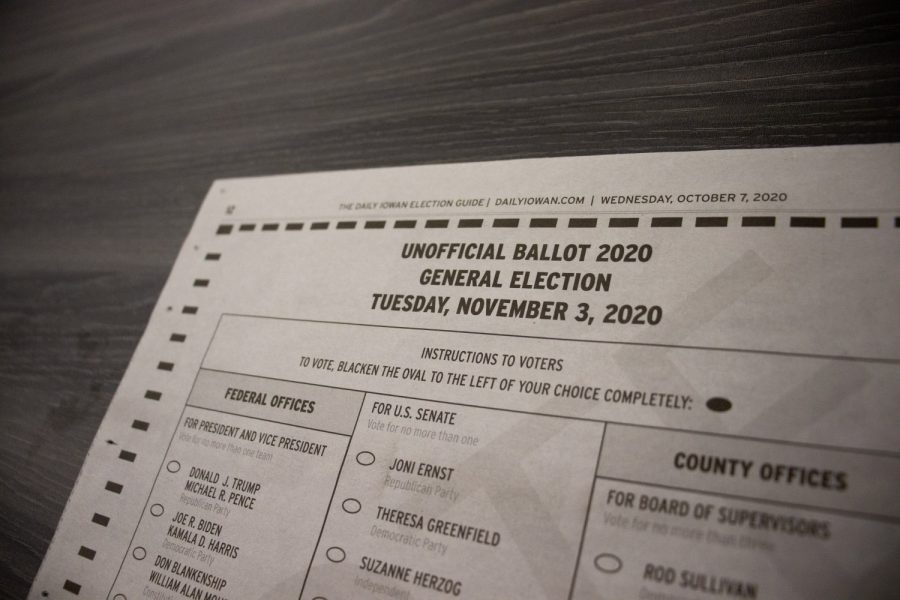Iowa auditors begin processing absentee ballots amid record early-voting
Some county auditors are confident Iowa will have results on election night as officials prepare to count a record number of absentee ballots.
Photo Illustration by Hannah Kinson
November 1, 2020
Hundreds of thousands of ballots have already been cast in Iowa prior to Nov. 3, and county auditors are preparing to count a record number of early ballots by the end of election night.
Johnson County Auditor Travis Weipert said more than 50 percent of active voters in Johnson County have already voted, and that he was seeing sometimes up to 1,000 cars a day in the county’s drive-through polling locations.
“I still don’t know how many people dropped their ballot off at our dropboxes, or how many voted at our library satellite site,” Weipert told The Daily Iowan on Oct. 28.
The Iowa Legislative Council approved a provision that allows county election officials to begin processing ballots the weekend before Election Day and to begin processing them Monday, the day before the election. This new provision, requested by the Iowa Secretary of State, will exponentially speed up the vote-counting process.
“We’ll have people counting ballots, we’ll still have people dropping them off … we’ll still have mail-in ballots coming in that need to be processed by another group — so, it’ll be a small army that day,” Weipert said.
He added that he’s confident Johnson County will have results on election night.
In some states, such as Michigan, Pennsylvania, and Wisconsin, election officials can’t start tabulating ballots days in advance. The pandemic caused an influx of mail-in ballots across the country, so results in some states will likely be delayed.
The number of early votes cast in the November election has already blown past 2016 numbers, and ballots that are postmarked by Monday still have until Nov. 9 to reach a county auditor’s office.
In total, 924,533 absentee ballots in Iowa have been returned as of Saturday, according to data from the Iowa Secretary of State, and more than 75,000 ballots that were sent out to voters have not yet been returned.
More Democrats have voted absentee than Republicans. Forty-six percent of ballots returned in Iowa have been from Democrats, 33 percent have been from Republicans, and 21 percent of ballots have been from independent or third-party voters.
In comparison, nearly 650,000 people voted absentee in the 2016 general election. The early vote tally this year represents 59 percent of total turnout in 2016, which came in at 1.57 million votes.
Linn County Auditor Joel Miller said his office possesses about 67,000 absentee ballots, and they expect that number to increase to 70,000 on Election Day.
Miller said Linn County has two high-speed scanning machines that can process about 18,000 ballots an hour. Under more normal circumstances, he said he would have a primary machine and a back-up machine on Election Day, but now he has two primary machines and no back-up.
Johnson County also has two machines, but both auditors are nevertheless confident their counties will see results on Nov. 3.
“We normally didn’t start the process of counting and opening [ballots] until Monday,” Miller said. “That worked before the pandemic … we now have substantially more ballots. The most [absentee ballots] we had in a previous election was probably around 45,000. So, if you have 70,000, obviously it’s just a matter of volume and that you need more time to count the ballots.”
Several early voters in Iowa City listed the pandemic as a reason they decided to vote before Nov. 3, hoping to avoid crowds and lines at polling places on Election Day.
People voting early at the Iowa City Public Library said they found the process easy, and that they appreciated the health precautions taken at the site.
“It was super easy, it wasn’t crowded. There wasn’t even a line,” Kate Smith, a 25-year-old Iowa City resident, said.
Iowa State University political-science Professor David Peterson said, while opportunities to vote early in Iowa weren’t widely expanded in this election compared to previous cycles, the opportunities were promoted more heavily, especially from Democrats. The most notable change from 2016, he said, is that Secretary of State Paul Pate sent out absentee ballot requests to all registered voters.
Peterson said the Democratic advantage in absentee votes could be a double-edged sword, as early votes have a higher rejection rate than traditional votes.
In 2016, 4,238 absentee ballots in Iowa were rejected, or about 0.65 percent of all absentee ballots cast, according to a report from USA Today. That’s lower than the national rate, which was about 1 percent in 2016, according to a report from the U.S. Election Assistance Commission.
Early voting also ensures that votes get sent in before Election Day, however, which can help voters avoid problems that could deter voting on Nov. 3.
“Things can happen on Election Day, people get busy,” Peterson said. “Something happens where people may not show up to vote, so if the votes are banked, and they’re in, that helps.”




